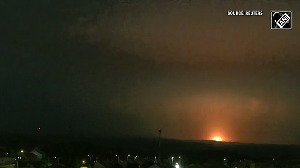Voting was on bipartisan lines and the final margin was overwhelming -- a prominent Indian-American community activist closely involved in behind the scenes lobbying efforts told rediff.com, moments after its passage, that the final majority was larger than the most optimistic estimates of the various lobbying groups.
The proceedings relating to the passage of the US-India nuclear cooperation agreement in the House of Representatives began at 5.30 pm Eastern (0300 IST) with House Resolution 947, which sought to provide for consideration of HR 5682, otherwise known as the United States and India Nuclear Cooperation Promotion Act.
House Resolution 947, which addressed the question of whether HR 5682 could be considered and voted on Wednesday, passed 311 in favour to 112 against with 9 US Congressmen not voting.
Republicans voted overwhelmingly in favour (224 in favour to 1 against) while Democrats were more ambivalent, voting 87 in favour to 110 against. One Indian-American community activist said a section of Democrats seemed of the view that there were other issues, mainly domestic, before the House that needed to be given greater priority.
Once HR 947 passed, the debate on various amendments began. As per the agreed upon provisions, each amendment would be subject to 10 minutes of debate before being voted on.
While some related to minor changes in language (Republican US Representative Ed Royce of California, for instance, asked that in Para 2 of the bill, the words 'United States' be replaced with 'Henry J Hyde United States'; the amendment was passed unanimously), a significant amendment was taken up at 7.05 pm Eastern, when Representative Cliff Stearns (Republican, Florida) moved to reinforce the intent of Congress that the nuclear cooperation into which the two governments would enter 'is for peaceful, productive purposes, and not military'.
At the end of a 10-minute debate, the amendment was put to vote. When John J Duncan (Republican, Tennessee), who had been nominated by House Speaker Dennis Hastert as chair for the bill, declared that the ayes had it, Stearns demanded a recorded vote (as opposed to voice vote). The chair then postponed further action on the amendment till later.
(Procedural note: Bills are brought to the floor of the House by various committees -- in this case, the House International Relations Committee. When voting on a bill, the full House first 'resolves itself into the Committee of the Whole House' -- in this case, the House resolved itself into the full HIRC, and appointed Duncan to chair it.)
Sheila Jackson-Lee (Democrat, Texas) then moved to express a 'sense of Congress' amendment declaring the importance of the South Asia region and urging the continuation of the United States' policy of engagement, collaboration, and exchanges with and between India and Pakistan. It was carried by voice vote.
A key moment came at 7.24 pm, when Representative Brad Sherman (Democrat, California) moved an amendment requiring that 'before any nuclear cooperation with India can go forward, and every year thereafter, the President must certify that during the preceding year India has not increased the level of domestic uranium it sends through its weapons program.'
The amendment required that the baseline for the determination under the amendment should be 'the 365-day period preceding the July 18, 2005 Bush-Singh declaration on nuclear cooperation', had earlier been proposed, and voted down, in the House International Relations Committee.
On Wednesday morning, the amendment formed the subject of a Dear John letter written by Representatives Hyde and Lantos to all members of the House, asking that they vote it down on the ground that it could prove a deal-breaker.
This amendment was voted down by voice vote. Sherman then demanded a recorded vote, and as with the Stearns agreement, the Chair postponed further action till later in the proceedings.
The second contentious amendment, which was also subject matter of the Hyde-Lantos Dear John Letter, was then moved by Howard Berman (Democrat, California).
It required that the House vote 'to restrict exports of uranium and other types of nuclear reactor fuel (defined as 'source material' and 'special nuclear material' in the Atomic Energy Act of 1954) to India until the President determines that India has halted the production of fissile material (that is, plutonium and highly enriched uranium) for use in nuclear weapons'.
The Sherman-Berman bills had been voted down by the HIRC June 28, by margins of 31-13 and 32-10 respectively.
Berman's bill was defeated here by voice vote; the lawmaker asked for a recorded vote and again, further proceedings were deferred. The House then considered an amendment moved by Jeff Fortenberry (R-Nevada), that sought to provide Congress with the ability to assess, to the extent possible, whether annual levels of India's nuclear fissile production may imply a possible violation of Article I of the Nuclear Nonproliferation Treaty. After debate, the amendment was agreed to by voice vote.
The chair then took up the unfinished business of recording votes on the Stearns, Sherman and Berman amendments.
The Stearns amendment, which sought to introduce language clearly stating that the deal would be strictly for civilian purposes only, was agreed to unanimously, with 414 lawmakers in favour and none against. 219 Republicans and 194 Democrats voted in favour; 11 Republicans and 7 Democrats did not vote.
The Sherman amendment was defeated by a margin of 268-155. 201 Republicans and 67 Democrats voted against Sherman, while 25 Republicans, 129 Democrats and 1 Independent voted in favor of an amendment that sought to cap the amount of domestic uranium India introduces into its nuclear programme.
A vote was then recorded on the Berman amendment, which sought to restrict export of all nuclear material to India until the President had verified that India had capped indigenous production of fissile material.
The amendment was defeated by a margin of 241-184. 189 Republicans and 52 Democrats voted against the Berman amendment, while 37 Republicans and 146 Democrats voted in favour.
It was increasingly apparent that Republicans were largely backing the bill as it stood, while a majority of the Democrats appeared to have reservations.
That trend became even more noticeable after the Berman and Sherman amendments were defeated, when Congressman Ed Markey (Democrat, Massachusetts) introduced a motion to recommit the bill to the House International Relations Committee 'with instructions' in other words, send it back with the requirement that it be rewritten before being voted on.
It was a crucial moment in the proceedings; passage of the Markey motion would have effectively ensured that the House would not be able to vote on the bill on Wednesday, and almost certainly would not have been able to take it up again before the summer recess.
Markey required to attach a new paragraph, which states that the President must certify that India is fully and actively participating in US efforts to dissuade, isolate, and, if necessary, sanction and contain Iran for its efforts to acquire weapons of mass destruction, including a nuclear weapons capability (including the capability to enrich or process nuclear materials), and the means to deliver weapons of mass destruction.
The motion was, even more than the Berman-Sherman amendments, a sure killer. Both India and the Bush administration have repeatedly stated that any attempt to link the bill to action on Iran will prove an immediate deal-breaker.
At 9.08 pm Eastern, the Chair announced the Markey motion defeated by a margin of 235-192. Underlining the division, 206 Republicans voted against Markey against just 29 Democrats; a mere 22 Republicans voted in favour, while 169 Democrats voted to send the bill back to Committee while.
Once the Markey motion was disposed of, HR 5682 was taken up for voting, and at 9.17 pm Eastern, the Chair announced its passage 359-68.





